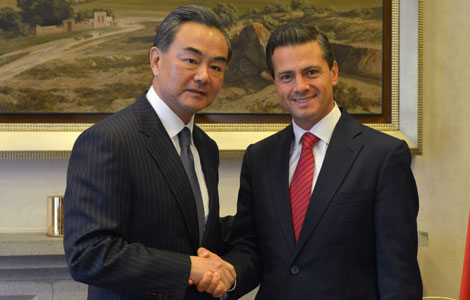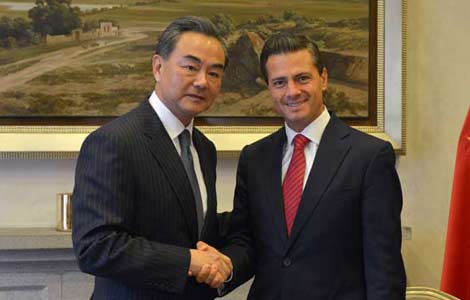Brazilians more aware of breast cancer symptoms, survey finds
Updated: 2014-10-06 03:22
By JACK FREIFELDER in New York(China Daily Lantin America)
|
||||||||
Brazilians came in as the most confident group in recognizing some telltale signs of breast cancer, according to a worldwide survey on awareness of the disease.
Sixty-one percent of Brazilians recognized some telltale signs; Chinese respondents were split evenly (50-50).
But less than half of the 10,000-plus respondents polled said they were confident in naming the most common symptoms of breast cancer, such as a change in the size or shape of breasts and any lumps or pain in the surrounding areas.
Participants from China and Brazil also lacked knowledge about other important information about breast cancer, including its link to dense breast tissue, the survey says.
"Awareness is really the foundation of everything as far as identifying cancers early," Jessie Jacob, chief medical officer of breast health for GE Healthcare, told China Daily. "Dense breast tissue is not an abnormal condition, but the majority of patients are not aware of the two main related concerns - a 'masking effect,' which can potentially limit the accuracy of mammography, and an increase in risk for breast cancer."
GE Healthcare's global study, The Value of Knowing, was released on Oct 2 in support of Breast Cancer Awareness Month.
Breast cancer is the most common form of cancer afflicting women, with 1.7 million new cases diagnosed worldwide in 2012, according to the most recent data from Susan G Komen, the world's largest breast cancer organization.
In May and June, Millward Brown, a New York-based global market-research firm, interviewed 1,000 people in 10 different countries on their knowledge of common signs of breast cancer. The survey also included a group of 250 women aged 40 to 70 and another group of 250 adults with relatives over the age of 65 from each participating country.
Other nations that participated in the survey were Australia, India, Indonesia, Japan, Russia, South Korea, the United States and the UK.
The study found that nearly three out of four people were unaware of the correlation between dense breast tissue and an increased likelihood for a woman's risk of developing cancer.
Women with dense breast tissue have four to five times higher risk of developing breast cancer, according to GE Healthcare, yet only one of five respondents globally had seen, heard or read about dense breast tissue in the media during the last six months.
"That is something that is really lacking as far as awareness out there in the general population," said Jacob. "What's important to understand is ... we're trying to have these informed conversations to find cancers early because the earlier you find cancers, the more treatable they are. But not one thing is good for everybody."
Russian (60 percent), Indonesian (58) and Chinese (34) participants were among the respondents most aware of the dense breast tissue issue, while those in Brazil (28 percent), the US (19), the UK (9) and Japan (2) were less informed.
Susan Brown, managing director of Health and Science Education for Susan G Komen, said on Oct 2 in a press release: "Pending legislation in the United States that requires doctors to inform their patients if they have dense breasts and the related risks will assist in the process of continuing to educate and empower women about their breast health."
The occurrence of breast cancer diagnosis per 100,000 women among Asian-Americans is 84.7, somewhat less common than the incidence for African-Americans ( 118.4) or Caucasian women (127.3).
In China, the figure for breast cancer among women is much lower, 40 per 100,000 among urban women and 15 per 100,000 in the countryside, based on the latest statistics from China's Ministry of Health.
And breast cancer is the leading cause of cancer death for Brazilian women, according to Susan G Komen.
In March 2011, Brazilian President Dilma Rousseff and the country's then Minister of Health Alexandre Padilha announced that $2.8 billion would be invested over the next four years in the fight against breast and cervical cancer, including strengthening primary healthcare and running public awareness-raising campaigns.
In 2011, GE also committed $1 billion to a five-year campaign against breast cancer by expanding cancer diagnostics, increasing imaging capabilities and encouraging the development of various educational programs in healthy living and early detection of the disease.
jackfreifelder@chinadailyusa.com
- Chinese hybrid rice yield hits record
- Fog affects flights, highways in N. China
- China issues white paper on Xinjiang Production and Construction Corps
- Some protesters in Hong Kong decide to withdraw, classes to resume
- 58 couples say 'I do' among the clouds
- Exhibition in Shanghai celebrating Snoopy's birthday

 Visitors trade cash for luck at World Heritage site
Visitors trade cash for luck at World Heritage site Sharapova beats Kvitova to win China Open
Sharapova beats Kvitova to win China Open
 China-Mexico ties deepen
China-Mexico ties deepen
 58 couples say 'I do' among the clouds
58 couples say 'I do' among the clouds
 Chinese convoy fleet executes escort missions in Gulf of Aden
Chinese convoy fleet executes escort missions in Gulf of Aden
 Chinese FM Wang Yi meets with Mexican president
Chinese FM Wang Yi meets with Mexican president
 China leads medal table as Asian Games close
China leads medal table as Asian Games close
 Highlights at Paris auto show
Highlights at Paris auto show
Most Viewed
Editor's Picks

|

|

|

|

|

|
Today's Top News
Some protesters in HK decide to withdraw
Brazilians more aware of breast cancer symptoms, survey finds
Ebola drugs not being used on Dallas patient: CDC head
Ebola could reach France and UK
China's Xinjiang Corp marks 60th anniversary
19 arrested over clash in Hong Kong
Li's European tour aims pragmatic cooperation
Services growth hits 8-month low
US Weekly

|

|








